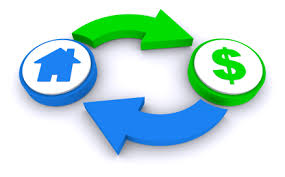
More and more Canadians are going into their retirement years without a lot of money saved in the bank. It is suggested that in order to live a financially comfortable retirement, couples should have saved 50-60% of their peak pre-retirement income, which equates to roughly $42,000 to $72,000 a year or $275,000 to $1,025,000. Singles should have saved 60-70% of their peak pre-retirement income, roughly $30,000 to $50,000 per year or $350,000 to $850,000. (Assuming mortgage is paid off and children are financially independent. All amounts based on 2014 dollars).
In a 2013 survey of 1,500 Canadians over the age of 50, only 2 out of ten households said they would have more than $250,000 saved for retirement. 50% of the households surveyed felt that they would consume their retirement savings within the first 10 years of retirement.
Because of these financial woes, many Canadian homeowners in their later years have considered taking out a home-equity loan or the option of a reverse mortgage to access the equity in their home.
Home-Equity Loan
Like a primary mortgage, a home equity loan lets you convert your home equity into cash. In fact, many refer to a home equity loan as a second mortgage, where you would receive the loan as a single lump-sum payment, and then you would make regular payments to pay off the principal and interest.
Another form of home-equity loan is the home equity line of credit (HELOC). A HELOC gives you the option to borrow up to a pre-approved credit limit, on an as needed basis. Therefore, with a home-equity loan, you would pay interest on the entire loan amount, whereas with a HELOC, you pay interest only on the money you withdraw. Since a HELOC is an adjustable loan, the payment changes as the interest rates fluctuate.
It is important to keep in mind that your home acts as collateral in a home-equity loan. So if you default on the loan, you risk losing your home to foreclosure.
Reverse Mortgage
With a reverse mortgage, instead of making payments to a lender, the lender will pay you, based on a percentage of the appraised value of the home, as well as factors such as your age and the age and the condition of the house.
You will continue to hold title to your home, but as soon as you become delinquent on the property taxes and/or insurance, the condition of the home is in disrepair, you move/sell the home or you pass away, the loan is then due for repayment.
Home Equity Loans, HELOCs and Reverse Mortgages are all options, which allow you to convert the home equity into cash, however, they differ in terms of credit, income, repayment, disbursement, age and equity requirements. Before you make any decisions, find out how to tailor your needs and requirements with the best product for your situation.
For more information on a reverse mortgage loan, contact me your mortgage professional at Dominion Lending Centres.
Contact me for your best mortgage options 705.669.7798 or trina@ndlc.ca
#trinamortgages #mortgages #ndlc #freedomofchoice
#bestmortgageforme #executive #firstimehomebuyer
If you found this information valuable, I only ask that you share with your friends and family.
Copyright DLC











